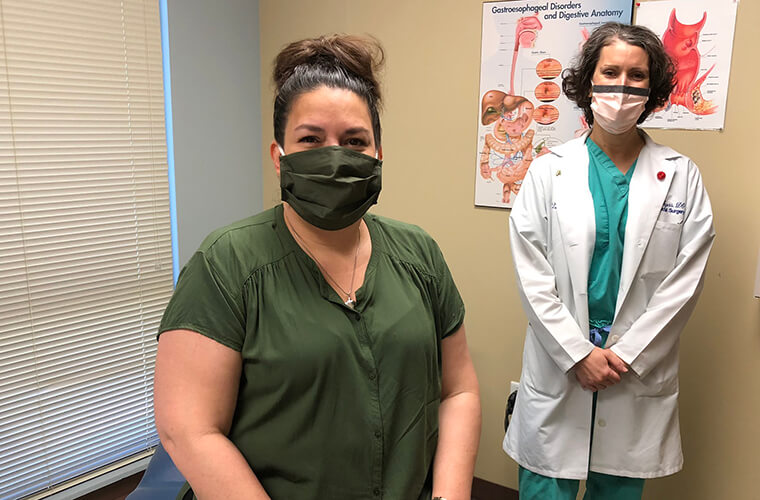St. Joseph’s Hospital Patient Shows Positive Outcome for Colon Cancer

Linda Pagan and Chadwick Boseman had something in common – they were both diagnosed with colon cancer at a young age – Pagan at 41, Boseman at 38 – and they both worked throughout their treatment without making their illness public. The difference is that Linda is a survivor.
Pagan becomes emotional when she thinks of what Boseman went through because she has been there. “Survivor guilt,” she calls it. “I feel bad thinking about what he went through for four years.” Wondering why some people survive and others don’t, she feels she must still be here for a reason. She hopes her story will save others.
About nine years ago, Pagan began having gastrointestinal (GI) issues. Her family doctor told her she had Irritable Bowel Syndrome (IBS) and was lactose intolerant. She accepted the diagnosis and suffered along for years without her condition improving.
When she began experiencing some gynecologic issues two years ago, she visited her gynecologist who recommended some imaging tests that showed an abnormality in her colon.
Pagan followed up with a group of BayCare Medical Group physicians who coordinated her treatment. Javier Nieves-Costas, M.D., conducted the colonoscopy that discovered the tumor; Elizabeth Myers, D.O., performed robotic surgery (a colectomy) at St. Joseph’s Hospital; and Oncologist Jennifer Giglia, M.D., guided Linda through her cancer treatment, that included chemotherapy at St. Joseph’s Hospital-North’s infusion center.
"As the current Cancer Liaison physician to the American college of surgeons for SJH Cancer Institute, I have made it a mission to grow our colorectal cancer program to provide comprehensive cancer care to our surrounding community so that patients don't have to travel beyond their backyard for high quality compassionate care, Dr. Myers said. “Our group had an organized plan for Linda's care that took some of the stress out of her cancer journey."
Pagan began chemotherapy around Thanksgiving 2018. When I walked into the infusion center, everyone started clapping,” she said. “When you’re so scared, it meant everything that they were all so compassionate.” Pagan completed her treatment three months later, all while earning her Bachelor’s degree in Management and Organizational Leadership at St. Pete College. “I didn’t tell anyone. I didn’t want it to affect my grade.”
Pagan has been cancer free for almost two years now. “Faith got me through it,” she said. As well as her husband, who is a paramedic, and her five children.
“She is a highly motivated patient who committed herself 100% to beating her cancer,” Dr. Myers said. “This made all the difference in her outcome.”
“I wish I had known better and pushed for a second opinion when I was first told it was IBS,” Pagan said. That’s what she suggests for others who have gastrointestinal problems.
“For even the most astute physician, it can be challenging to determine who warrants further workup with a colonoscopy for complaints such as constipation, rectal bleeding or abdominal pain, as there are also many benign causes for these symptoms, Dr. Myers added.” “Primary care physicians are on the front lines seeing these young patients and colorectal cancer should always be on their radar.”
Besides seeking a second opinion, Pagan’s other advice is to be an advocate for yourself, speak up and be prepared. Also, keeping a spreadsheet and papers in a color-coded binder and keeping tabs on the insurance company made her feel like she had more control over the situation.
After her illness, Pagan underwent genetic testing and found out that her 80-year-old uncle had cancer months before she was diagnosed. Her experience convinced her 11 brothers and sisters to get tested as well.
“For some time now, colorectal cancer has been on the rise in patients under the age of 50, which prompted the American Cancer Society to begin recommending average risk screening colonoscopy to patients starting at age 45 rather than 50 in recent time,” Dr. Myers said. “The number one presenting sign of colorectal cancer is being asymptomatic. This is why screening is so very important and evaluation of persistent GI complaints even more paramount, in both older and younger patients.”
These days, Pagan shares her experience with the Colorectal Cancer Alliance, answering questions for other patients. In addition, she has returned to school studying for a second Bachelor’s degree. Pagan is a busy person but she takes time to enjoy simple pleasures. “I can eat ice cream again!”
To learn more about colon cancer, visit BayCareColonHealth.org.

